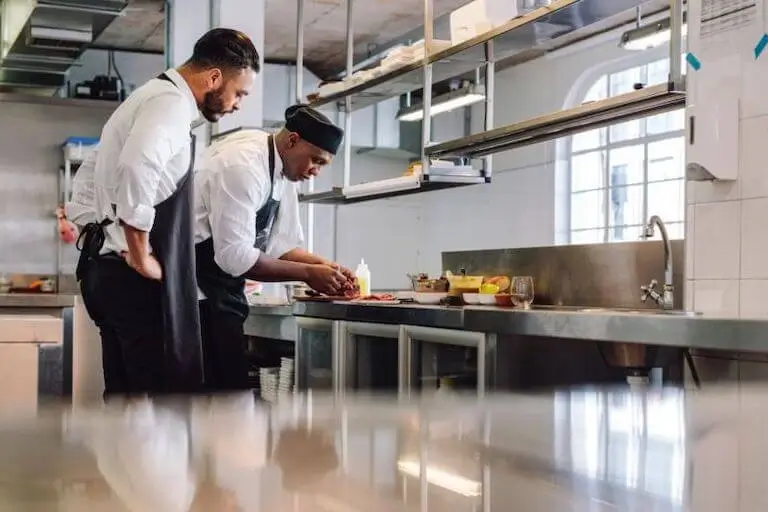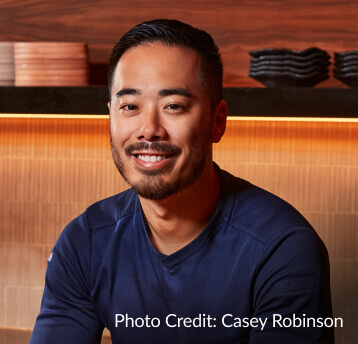Listen to This Article:
Many chefs enter the culinary world because they love food—creating it, tasting it, and seeing people enjoy what they’ve made. But while culinary talent is essential, it isn’t always the skill that leads to the highest paychecks or top leadership roles in the industry.
“You are not a chef,” Executive Chef and restaurant owner Tim Condon says, “until you are able to monetize your field.”
Cooking ability alone can get you in the door, but business acumen—the ability to understand how your kitchen runs as a business and how to make decisions that help it succeed—may help chefs advance in their careers.
In this article, we’ll explore what business acumen really means for chefs, the skills it includes, and how it can open up opportunities for leadership roles, promotions, and income growth. Whether you’re aiming to become an executive chef, manage multiple units, or open your own restaurant, building these skills alongside your culinary expertise may help distinguish you.

High-earning chefs combine culinary skills with teamwork, leadership, and strategic decision-making.
Why Cooking Ability Alone Isn’t Enough
While a passion and a love for food may lead someone to a culinary career, it’s often not enough to help them reach the highest earning levels in the industry. Salary data comparing different culinary roles shows that chefs who take on leadership and business-focused responsibilities tend to earn significantly more than those who focus on cooking alone.
According to the U.S. Bureau of Labor Statistics, the median annual wage for chefs and head cooks is $60,990, with the top 10% earning over $96,030.
So what makes the difference? Chefs who move into leadership and business-focused roles often see their earnings rise significantly. Executive Chefs may earn a median annual salary of $94,000. These chefs are responsible for additional tasks like menu oversight, staffing, and operational leadership. Corporate Executive Chefs, who often oversee multiple locations, may have an average compensation of around $131,364 per year.
*Information may not reflect every student’s experience. Results and outcomes may be based on several factors, such as geographical region or previous experience.
If you’re aspiring to be a chef or work your way up in your career, these aren’t simply numbers. These salary differences tell an important story. The chefs who earn the most aren’t just good cooks, they’re business leaders who know how to lead their teams, manage costs, and make smart business decisions. They are the chefs who help keep kitchens running smoothly and run successful restaurants.
The One Skill That Sets High-Earning Chefs Apart: Business Acumen
When chefs hear “business acumen,” it might sound intimidating or like something only restaurant owners need. But business acumen is simply the understanding of how your kitchen or operation works as a business and how to make decisions that improve its success.
Here are some key components of business acumen for chefs:
Financial Management
Financial management for chefs means knowing exactly how money flows in and out of your kitchen. It involves:
- Food cost control: Calculating food cost percentages for each dish to ensure menu pricing covers expenses and generates profit.
- Inventory management: Keeping accurate inventory to reduce waste, prevent spoilage, and optimize ordering schedules.
- Labor management: Scheduling staff efficiently to meet business needs without overspending on labor costs.
- Vendor negotiations: Building relationships with suppliers to get better pricing, higher-quality products, or discounts on bulk orders.
- Menu engineering: Designing menus that maximize profitability by featuring items with lower food costs and higher perceived value.
“When you start by focusing on the intended use of a product in your kitchen, you can make smarter decisions about the level of quality you actually need,” says Chef Instructor Matt Kuerbis. “After all, we don’t reach for top-shelf liquor every time we mix a cocktail—it’s about how the ingredient fits the final experience.”
Example: Imagine you analyze your appetizer menu and realize one dish costs 40% of its selling price, while others are closer to 25%. Adjusting portion size, renegotiating ingredient prices, or reworking the recipe could increase your profit margins significantly across hundreds of orders each month.

Tracking food costs and analyzing pricing are essential parts of financial management for chefs.
Why it matters: Chefs with strong financial management skills are often entrusted with higher-level roles managing budgets and operations. This can qualify them for executive chef positions with salaries over $90,000 a year, and it can also give them the confidence to open their own businesses.
People Management & Leadership Skills
People management is about creating a positive, productive environment where your team thrives. It can involve:
- Training and development: Teaching cooks proper techniques, efficiency, and consistency to maintain quality and reduce costly mistakes.
- Communication: Giving clear directions, feedback, and encouragement to build trust and teamwork.
- Conflict resolution: Addressing issues calmly and fairly to keep morale high and staff focused.
- Scheduling and delegation: Placing the right people in the right roles each shift and empowering them to take ownership.
Example: If your prep cook is struggling to keep up, rather than criticizing them during a busy service, you could train them in better knife techniques and prep organization. This investment can improve their confidence and speed, benefiting the entire kitchen operation.
Why it matters: Managers who are good with people build loyal teams that result in reduced turnover, potentially saving the business thousands in hiring and training costs. They create kitchens that run smoothly without constant supervision. This is often why chefs who excel at managing people are promoted into executive or regional chef positions with higher salaries.
Operational Efficiency & Problem Solving
Operational efficiency means running your kitchen smoothly and addressing issues before they become problems. It involves:
- Workflow optimization: Setting up stations and prep processes for speed and consistency.
- Time management: Prioritizing tasks to keep service flowing without delays.
- Problem solving: Quickly finding solutions to unexpected challenges, such as equipment failures, staff call-outs, or delivery issues.
Example: If your fryer breaks during dinner service, you immediately rework the ticket flow, adjusting the menu temporarily to focus on grill and sauté items. This keeps orders moving, avoids long waits, and maintains guest satisfaction.
Why it matters: Chefs who excel at operational efficiency can reduce waste, control labor costs, and keep customers happy even during challenges. These skills can demonstrate reliability and leadership, qualities that may be valued by owners and executives.
*Information may not reflect every student’s experience. Results and outcomes may be based on several factors, such as geographical region or previous experience.
Innovation & Market Adaptation
Innovation is about keeping your offerings fresh and adapting to trends and customer needs. It involves:
- Menu development: Creating new dishes or reworking existing ones to maintain excitement and relevance.
- Trend awareness: Staying up to date on culinary trends, dietary preferences, and emerging ingredients.
- Business model adaptation: Adjusting services based on market changes, like adding takeout, meal kits, or private dining experiences.
Example: You notice guests are asking for lighter, healthier lunch options. You develop a grain bowl with seasonal vegetables and a house-made vinaigrette, which quickly becomes one of your top-selling lunch items.

Developing new dishes keeps your menu fresh and aligned with customer preferences.
Why it matters: Chefs who innovate and adapt can help their restaurants stay competitive and attract new guests. This may help increase revenue and can position them as forward-thinking leaders, opening opportunities for executive roles or entrepreneurship with higher income potential.
Marketing & Personal Branding
Marketing and branding involve promoting your food, your team, and yourself to build reputation and attract customers. It includes:
- Guest engagement: Connecting with diners by sharing dish stories, checking in at tables, or hosting chef’s table experiences.
- Social media presence: Share photos of your menu items, behind-the-scenes prep, and your team’s personality to create excitement and keep your restaurant visible online.
- Networking: Connect with local media, fellow chefs, and community organizations to build relationships that can lead to collaborations and more exposure for your work.
Example: Imagine you’re getting ready to launch a new brunch menu. You build excitement with customers by sharing photos and stories about the new dishes on Instagram throughout the week leading up to the launch. The excitement helps fill the dining room for the first weekend.
Why it matters: Chefs with strong marketing and branding skills can grow their personal reputation and the restaurant’s brand, attracting more customers and creating new opportunities. This visibility may lead to opportunities such as promotions, media features, consulting offers, and business partnerships that could increase income.
Understanding the business side of the kitchen can help transform your career, possibly opening doors to leadership roles, higher earnings, and the chance to make a lasting impact on your team and restaurant.
How You Can Start Building Business Acumen Today
Building business acumen doesn’t happen overnight, but every chef can explore ways to strengthen these skills right where they are.
“The triple threat of a chef: culinary skills, leadership, and financial acumen,” says Evan Kaplan, a recruiter at Gecko Hospitality. “If you’re missing one, your foundation isn’t solid.”*
*Information may not reflect every student’s experience. Results and outcomes may be based on several factors, such as geographical region or previous experience.
In other words, even if you’re a talented cook, building your leadership and business skills is what can create a solid foundation for your career. The good news is, whether you’re a line cook or a sous chef, there are practical ways to keep growing these skills and preparing for higher-paying leadership roles.
Here are ways you can continue growing your career, moving up the ladder, and increasing your income:

Learning from mentors in the kitchen helps chefs build leadership and business skills.
Learn on the Job
Understanding the business side of a kitchen starts with paying attention to what’s happening around you each day. This goes beyond prepping and plating—it includes observing how decisions are made about ordering, scheduling, menu pricing, and daily operations.
Chefs who understand these decisions can be better prepared to move into leadership roles. For example, noticing why your executive chef chooses one vendor over another or how your kitchen manager schedules staff to control labor costs can teach you practical business strategies you won’t find in a recipe book. These insights can help build your confidence to manage costs, lead teams, and even to run your own kitchen or restaurant.
Action step:
Tomorrow, ask your executive chef or kitchen manager about one non-culinary decision they make daily, such as how they choose which supplier to order from. Listen and learn how that decision impacts the restaurant’s success.
Seek Mentorship
Mentorship is one of the fastest ways to build business acumen because you’re learning directly from someone with real-world experience. A mentor can help you understand financial decisions, leadership challenges, and operational strategies. This guidance can shorten your learning curve and give you confidence to take on more responsibility.
Chefs who actively seek mentorship show they’re committed to growth, which can stand out to owners and managers when leadership opportunities arise. It can also help you grow your network, opening doors to future job offers, recommendations, or partnerships.
If you’re attending culinary school, like Auguste Escoffier School of Culinary Arts, mentorship is built into your education through your interaction with professors who have industry expertise, peers sharing different kitchen experiences, and industry externships that can connect you with working professionals who can guide you as you develop your skills.
Action step:
Identify one person in your kitchen or professional network who manages budgets, leads teams, or runs operations effectively. Ask them if they’d be willing to share insights or allow you to shadow them for an hour on a prep day.
Take on Small Leadership Opportunities
Leadership experience isn’t just about running an entire kitchen—it’s built through small, everyday opportunities that prove you can take initiative and responsibility. This might look like training a new line cook, overseeing inventory for a shift, or creating the prep list for the day.
These tasks may demonstrate to managers that you can handle more than your assigned duties and that you’re ready to support the team at a higher level. Chefs who build leadership skills in small ways may become strong candidates for sous chef or chef de cuisine promotions.
Action step:
Volunteer to train a new line cook on a station you know well, or ask your chef if you can create the prep list for an upcoming shift.
Stay Aware of Industry Trends
Understanding what guests want and where the industry is headed can help you keep your skills and menus relevant. This could include learning about plant-based trends, sustainable sourcing, or shifts in dining preferences like meal kits and takeout innovations.
Chefs who stay aware of trends can suggest menu changes or operational adjustments that increase customer satisfaction and revenue. This strategic thinking is highly valued in executive roles and can set you apart as someone who can drive the business forward.
Action step:
This week, read one industry article or follow a leading culinary publication on social media. Note a trend you see and think about how it could apply to your current menu or service.
Invest in Your Education
Formal education can combine business knowledge with culinary technique, equipping you with the skills employers are looking for in leaders. Programs at Escoffier can help you explore food cost control, menu design, leadership, and marketing alongside culinary arts.
Chefs who invest in their education may have opportunities to advance their careers because they bring both kitchen skills and business acumen to the table. This combination may help increase your earning potential and prepare you for roles like executive chef, food and beverage director, or restaurant owner.
Action step:
Explore Escoffier’s culinary and hospitality programs to see how you can build these skills to support your career goals.

Formal education can help chefs build both culinary skills and business knowledge.
Start Tracking Your Growth
Building business acumen is a journey, and tracking your learning can help you stay motivated. Reflecting on what you’re discovering about business and leadership each week can show you where you’re improving and where you can focus next.
Chefs who track their growth can build confidence and demonstrate to themselves and others that they’re serious about their career development.
“Visualize where you want to be in 10 years,” says Chef Matt. “Look at job descriptions for roles with the salary you’re aiming for, and identify the skills they require. Then talk to your chef about how you can start developing those skills now.”
Action step:
At the end of your week, write down one thing you learned about business, leadership, or operations and one area you want to learn more about next week.
Key Business Acumen Skills for Chefs
| Skill | What It Includes | Why It Matters |
|---|---|---|
| Financial Management | Food cost control, inventory, labor management, vendor negotiations, menu engineering | Drives profitability, qualifies chefs for higher-level roles, and builds confidence to run their own business |
| People Management & Leadership | Training, communication, conflict resolution, scheduling, delegation | Builds strong teams, reduces turnover, and prepares chefs for promotions |
| Operational Efficiency & Problem Solving | Workflow optimization, time management, quick decision-making | Keeps kitchens running smoothly, saves money, and demonstrates leadership reliability |
| Innovation & Market Adaptation | Menu development, trend awareness, adapting services | Keeps the restaurant relevant, drives revenue, and positions chefs for executive or entrepreneurial roles |
| Marketing & Personal Branding | Guest engagement, social media, networking | Attracts customers and opportunities, builds professional reputation, and increases income potential |
Why Business Acumen Can be the Key to a High-Earning Chef Career
Business acumen is a key skill that can separate chefs who stay on the line from those who lead teams, influence decisions, and earn top salaries. While culinary talent opens doors, it’s your ability to manage finances, lead people, solve problems, adapt to trends, and market yourself that can truly help you build a thriving career.
“Don’t avoid the hard work, because you will be a better chef for it,” says Chef André Natera, award-winning chef, author, and culinary consultant. “If you don’t push yourself, and you continue on with your normal routine, the good thing is probably nothing bad will happen to you. You’ll be nice and safe. But on the contrary, nothing good will happen to you either. You’re going to be stuck because at a certain point in your career you’re going to have to walk through fire to get to that coveted executive chef position.”
Escoffier’s programs can combine hands-on culinary training with the business and leadership education today’s industry demands. Contact us to explore how our culinary and hospitality programs may help you build skills that could support your career goals.



